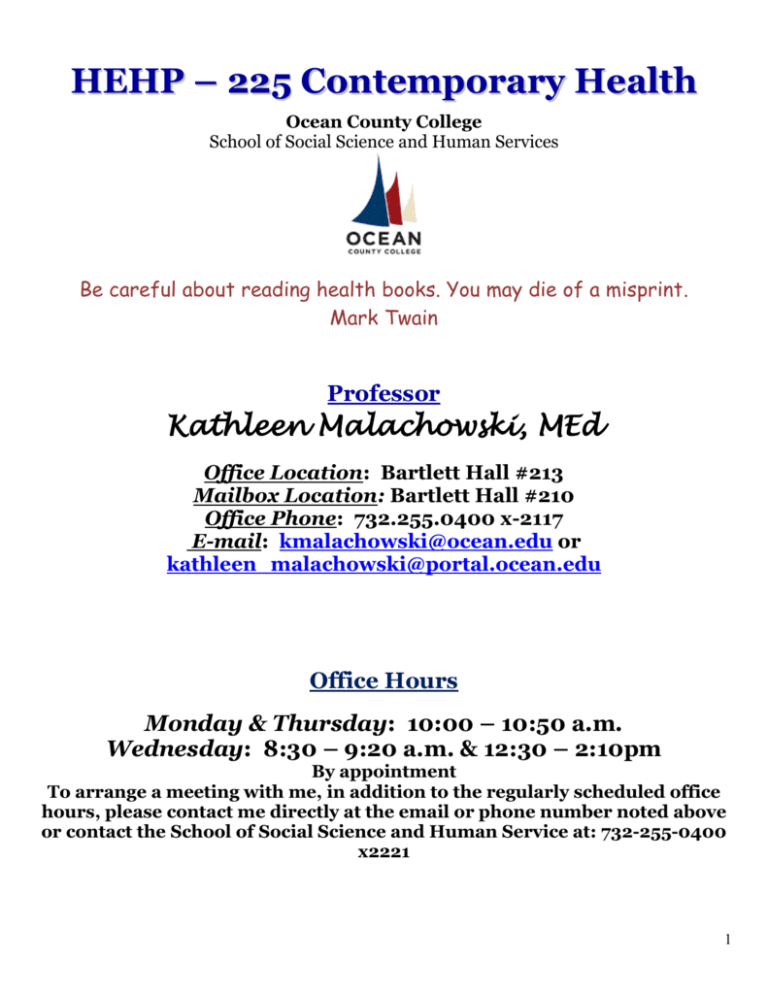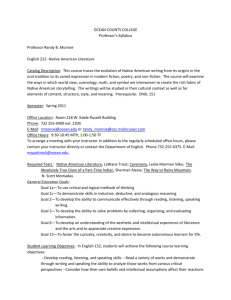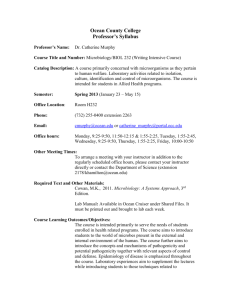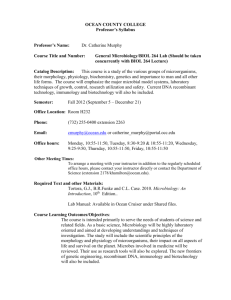HEHP 225 - Ocean County College
advertisement

HEHP – 225 Contemporary Health Ocean County College School of Social Science and Human Services Be careful about reading health books. You may die of a misprint. Mark Twain Professor Kathleen Malachowski, MEd Office Location: Bartlett Hall #213 Mailbox Location: Bartlett Hall #210 Office Phone: 732.255.0400 x-2117 E-mail: kmalachowski@ocean.edu or kathleen_malachowski@portal.ocean.edu Office Hours Monday & Thursday: 10:00 – 10:50 a.m. Wednesday: 8:30 – 9:20 a.m. & 12:30 – 2:10pm By appointment To arrange a meeting with me, in addition to the regularly scheduled office hours, please contact me directly at the email or phone number noted above or contact the School of Social Science and Human Service at: 732-255-0400 x2221 1 Course Description Students will develop skills needed to meet challenges to their health and optimize their physical and psychological wellbeing. Topics to be examined include consumer education, fitness, family living, nutrition, mental health, dependency, substance abuse, and infectious and chronic diseases. The focus of the course will be on the importance of critical thinking emphasizing self-empowerment, prevention and understanding the health impact on human diversity. Required Texts Access to Health(ATH), 12th Edition, Donatelle, Pearson Benjamin Cummings 2012. ISBN 10: 0-321-69908-4 or ISBN 13: 978-0-321-69908-4 Personal Wellness Assessment(PWA), Pearson Custom Publishing, 2011. ISBN-13: 978-1-256-12644-7 or ISBN-10: 1-256-12644-6 Course Objectives/Student Outcomes 1. Discuss health in terms of its dimensions and historical, current, and future 2. 3. 4. 5. 6. 7. 8. 9. perspectives. Examine your present health behaviors and discuss the importance of developing healthy habits. Identify and implement the techniques necessary to change an unhealthy behavior. Evaluate the role of gender in disparities in health status, research and risk. Examine the latest research and strategies needed to prevent disease and promote wellness. Analyze and discuss the unique health behaviors and how they contribute to morbidity and mortality rates in the U.S. Explain the importance of a global perspective on health and the health challenges faced by people of various racial, cultural and ethnic backgrounds. Evaluate sources of health information, particularly the Internet, to determine reliability. Examine your role in protecting global health through the adoption of a green lifestyle. General Education Goals Addressed in the Course #3 – To develop the ability to solve problems by collecting, organizing and evaluating information. Students collect, organize and evaluate laboratory data on themselves. For example, blood pressure and body fat composition. Once the information is collected, organized and evaluated the student puts a plan together on how to manage their blood pressure and to lower their body fat percentage. #8 – To develop an understanding and appreciation of diversity among cultures, including respect for various ways of viewing the world. We discuss the differences between ethnic groups pertaining to health risks. For example, African Americans are more prone to strokes than Caucasians. #9 – To develop global perspective on problems and issues that humankind faces and to explore solutions which are morally, socially, economically, politically and ecologically sound. Discussions of the morality and ethics of the Health Care System. Having a good rapport with your nurse or physician can have a positive effect on a patients recovery. We will discuss how your health can be effected by ecological and environmental changes. #10 -To develop an understanding of how health and well being is necessary to 2 confront the challenges facing individuals, families and communities. All issues of health and well-being are directed to the student in a manner that encourages them to apply the information to themselves, their present and future families as well as the community. Assessment of Outcomes This course will implement several tools to access your progress and accomplishments toward the outcomes listed above. These tools include: Chapter Exams: 50% of Final Grade There will be one exam for every unit. There are 5 units. Each exam will be worth 10 points. Exams will be comprised of 80 - 100 multiple choice questions. You will be given a class period to complete the exam. Review for Exam Sheets: 20% of Final Grade There will be one review sheet for each of the five exams. Each exam review sheet will be worth Zero or 4 points. Please pay close attention to the information stated on each of the 5 review sheets. The exam review sheets are located in the Personal Wellness Assessment book in Appendix B and will also be posted on Ocean Cruiser. Practice Quizzes: 9% of Final Grade Each of the 18 chapters has multiple choice practice quizzes on your textbook website www.aw-bc.com/donatelle. Each of the 18 multiple choice practice quizzes with a score of 80 or better will be worth ½ point. Current Health News(CHN) Writing Assignments: 15% of the Final Grade One of the goals in this course is for you to connect the health topics we cover in class to the health issues occurring in every day life or the lives of others you know. Each CHN writing assignment is worth 3 points. Students will be required to submit one CHN writing assignment per unit. Each writing assignment needs to be double spaced and a minimum of 240 words. See the CHN Guidelines on a separate page posted to cruiser. If you present your one page CHN to the class, you may add 1 point toward the CHN or add the point to your extra credit. Writing assignments cannot be made up and will not be accepted late. Behavior Change Contract: 3% of the Final Grade A complete behavior change contract is worth 3 points. The form you will turn in is found in two locations. It is a tear out card in front of your textbook or in your Personal Wellness Assessment book on page 81. Orientation Quiz: 3% of the Final Grade You will be quizzed on this Professor Syllabus, Course Schedule, Current Health News Guidelines and Extra Credit page. These can all be found on Ocean Cruiser. 3 Extra Credit: A maximum of 10 extra points towards your final grade The Personal Wellness Assessment (PWA) textbook self assessments – see separate page with required pages for each unit. Each of the 5 unit’s set of pages will be worth 1 extra credit point. See page titled Extra Credit on Ocean Cruiser. A total of 5 extra credit points can be earned. You must total all scores of the self assessments and answer any questions to obtain the extra credit point. Workout card (page 113 & 114) – 24 workouts that include a minimum of 11 weight training exercises and 30 minutes of aerobic activity. The entire card on one side and 7 workout columns on the second side equal 24 workouts. Twenty four workouts are worth 2 extra credit points. There will be no partial credit. Body fat and blood pressure lab page 247 in your PWA book. The page must be completed in its entirety for 2 extra credit points. There will be no partial credit. Health seminars attendance and one page summary of what you learned from attending is worth 2 extra credit points. Present your CHN to the class for 1 extra credit point. Class Participation & Attendance Zero to three additional points on top of your final average, not to exceed a total of 10 points o o o o 3 Points 2 or fewer absences Punctuality Participation in class discussions No electronic device usage 1 Point o 4 or fewer absences o Punctuality o No electronic device usage 2 Points o 3 or fewer absences o Punctuality o No electronic device usage o o o o Zero Points More than 4 absences Consistently coming to class late Usage of electronic devices Talking to others during lectures Grading Policy The final grade in the course will be the cumulative grade based on the following letter grades or their numerical equivalents for the course quizzes, exams, & assignments: A = B+ = B = C+ = C = 90-100% 86-89% 80-85% 76-79% 70-75% D = 60-69% F = 0-59% I = Incomplete R = Audit W = Withdrawal (prior to drop date) Instructor Drop Policy I cannot issue a withdrawal “W” after Ocean County College’s official withdrawal deadline. o The deadline for the 2012 Fall Semester is Wednesday, November 7th. 4 It is the student’s responsibility to drop the class and to be aware of the drop deadlines. I will NOT drop a student from a class for failure to attend. o An F or grade earned will be given to students who do not officially withdraw by the withdrawal deadline. Communicating With Me To reach me by e-mail Please use kathleen_malachowski@portal.ocean.edu or kmalachowski@ocean.edu for e-mail communication. E-Mail Standards E-mails are required to be in a courteous format in order to get a response. Below is the format I prefer: Start with a greeting such as: “Hello Professor Malachowski” “Dear Professor Malachowski” Since your e-mail will be one of many I receive please identify what class you are in. I have a lot of students. “This is Mary Jones from your Contemporary Health class, Section 2.” “This is Rob Smith from your Contemporary Health class, on M/Th at 2pm.” The next part of the e-mail should explain the purpose clearly and concisely “I missed class and did not get my grade on the last exam. Could you let me know what I got?” “I was in the hospital for the past two weeks and was unable to attend class. I would like to discuss this with you. Could you please call me at ..” Finally, your closing “Thank you, Joe Flynn” “Sincerely, Robin Hood” I will not reply to emails that look like text messages or do not follow the format described above!!! Why? 1. A college class is a professional forum. We should address each other with the respect and cordiality that is expected in any professional atmosphere. 2. Part of my role as an educator is to help you to develop skills that will allow you to meet and exceed your career goals. Effective communication skills are essential in your pursuit of professional success! To reach me by telephone You can call and leave a message in my confidential voice-mail @ 732.255.0400 x. 2117 In your voicemail message, please state your first and last name and the course you are taking with me (“This is Mary Jones from your Contemporary Health, Section 2”) If you would like me to call you back, please state a good telephone number and time at which I can reach you. When leaving your number, please speak slowly and clearly. I will respond to all voicemail messages that require a return call by the 3rd school day (at the latest) after they are received. To see me in person You're invited to visit my office on the OCC Main Campus in Toms River. My office is located in Bartlett Hall Room 213. 5 My office hours are posted at the top of the syllabus as well as outside my office door. You're welcome to stop by during those times to see me without an appointment. If my office hours are not convenient for you, please call to arrange an appointment at a mutually convenient time during business hours. Course Standards and Policies 1. Statement of Civility: In any learning environment, it is essential that participants treat each other with respect, or the learning process collapses. Consequently, everyone participating in this class is expected to communicate courteously and appropriately with each other. Comments made in the classroom should show respect for your fellow classmates. There may be times when a student shares personal information in class. Everyone is expected to keep personal information confidential. Remember that everyone is entitled to their opinion. Foul language or derogatory statements should not be part of a college classroom. The professor has the right to ask you to leave; it is up to you to schedule an appointment to discuss the dismissal prior to returning to the classroom. Cell phones should be turned off prior entering the classroom. In the case of an emergency and you are required to be available for a phone call, the cell phone should be on vibrate. Leave the classroom before taking the call. Text messaging, MP3, or iPods are not allowed in class. Please do not read, write or respond to a text message during class time – 2 points will be taken from your final grade every time I see someone using a electronic device during class time. Chewing tobacco use in the classroom is not allowed. Excessive lateness and disturbance of the class may require withdrawal. 2. Late/Missed Work: A key to success in college and any other type of endeavor is time management. All of these assessments have clear, firm deadlines. Plan accordingly! Late work will not be accepted, and there will be no opportunity for make-ups. Exceptions are rare and will be given only when the professor is informed in advance regarding the reason for the late work AND when the student has established a track record of consistent participation and meeting deadlines in the course. Please don’t wait until an assignment is late to inform me of the reason that it’s late! 1. Missing an Exam: You MUST bring in justification for your absence (i.e., a doctor’s note – not a copy of it, but the original). This excuse will only be accepted on the next class period you attend class – no exceptions. Exams must be made up before the next unit exam is given. Once the next unit exam is given, a previous exam cannot be made up. If you do not speak to me or email me within one week from the exam date, you will not be able to make the exam up and will receive a zero for that exam. 3. Participation Policy: Effective learning is an interactive process, so students are expected to be prepared to participate in small-group and whole-class discussions of course material. In traditional classes, students attain maximum academic benefit through regular class attendance and participation. Nothing else has yet been discovered to replace in value the daily, cumulative, educational growth that results from regular participation in class. This is especially true when ideas, concepts, points of view, social development, poise, confidence, knowledge and success derive from the 6 interaction among students and faculty. Therefore, attendance and participation are critically important!! Please monitor your own attendance and grades by recording your grades throughout the term, and be advised that Wednesday November 7, 2012 is the last day to withdraw from class. It is important to know where you stand in the course, ask if you are unsure. 4. Academic Honesty Statement: Ocean County College is committed to a learning environment that embraces the principles of honesty. Faculty, students, and administrators share responsibility for maintaining this environment of academic honesty and integrity by accepting responsibility for all of their actions—personal and academic. Each member of our community is expected to read and understand our Academic Honesty Statement, which can be found in the student handbook and at the following web address: http://www.ocean.edu/studentlife/Handbook/Academic_Information_and_Regulatio ns.htm Academic dishonesty includes, but is not limited to: plagiarism, cribbing and cheating on exams, quizzes, class projects and/or papers. Any student aiding another student in any form of dishonesty is considered equally accountable. If a breach in academic honesty occurs, Academic Dishonesty Policy #5180 gives faculty authority to impose academic sanctions which are reasonable and commensurate with the violation. 5. Plagiarism Statement: Plagiarism can be defined as "the unacknowledged use of another's means of expression and/or work product, whether published or unpublished, without proper credit through the use of quotation marks, citations and other customary means of identifying sources." Essentially, this means copying the words or ideas of another without the proper form of academic documentation. There are two basic kinds of plagiarism: 1) deliberate plagiarism and 2) accidental plagiarism. One may sound more acceptable than the other, but they are equally serious academic offenses. The most common act of deliberate plagiarism involves copying another person's work and passing it off as your own. The most common act of accidental plagiarism involves failing to provide the proper internal documentation for quoted, summarized and paraphrased ideas from another person, even if you list the source in your References. In this class, both deliberate and accidental plagiarism will be dealt with in the same manner. The first instance of plagiarism will result in a zero (0) for that assignment and require a student-professor conference. A second offense will result in an F for the course and the enforcement of any other appropriate academic sanctions. For a description of the College’s guidelines on plagiarism, please see Policy #5180 in the Student Handbook Campus Resources and Services 1. The Center for Academic Excellence provides a comprehensive range of services to students with documented disabilities. The Center for Academic Excellence is located in the library. For assistance, please visit the Center or contact one of the Center’s staff at 732-255-0456 (TTY/TDD & Voice: NJ Relay 711). 2. Tutoring: The Writing Center, which is located on the main campus in Russell Building Rm. 124, provides assistance with writing in all subject areas, not just in English classes. Also located in the Russell Building (Rm. 123), you will find the 7 Mathematics Tutoring Center. To find out availability of the tutors, you may contact the Writing Center in person or by phone (732-255-0400 ext. 2262). 3. Library: The Library has special instructional sessions that will help you make full use of their resources. Be sure to seek out the help of the Reference Librarian if you are having difficulty finding references or getting started on a research project. 4. “Power” Strategy Seminars (a.k.a. Study Strategy Sessions) are designed to help students get the most out of their college experience. These sessions cover topics like time management and effective note-taking. Even the best students will benefit from participating in these seminars. All “Power” Seminars take place in L103 unless another location is noted for a particular session. The Seminar schedule is posted on the OCC website (under “Campus Resources and Services”, on Ocean Cruiser, and on a bulletin board at the entrance to L014B. For more information about these seminars, contact the Center for Academic Excellence at 732-255-0456. 5. Computer Labs are located in the library, the Instructional Computer Center, and the Technology Building. In order to use the computer labs, you must schedule an appointment. Appointments are scheduled for one (1) hour at a time. You can schedule an appointment by calling the lab at 732-255-0358 or by making an appointment in person at the lab technician’s desk. If you do not schedule an appointment, you must check in with the lab technician before entering the lab. 6. Information Technology Services. If you have a question about or a problem with any computer- or technology-related issue, you may contact the IT Helpdesk by phone (732-255-0400, ext. 2144) or by email (helpdesk@ocean.edu). 7. Counseling Services: Ocean County College offers short-term, solutions-based counseling services to everyone in the College community free of charge. Counseling is available to help people cope with the everyday challenges that strain our emotional, mental and physical resources. For more information, contact Counseling Services at 732-255-0400 (ext. 2941). Statement of Accommodation A wide variety of services are available to students with documented learning disabilities or other kinds of disabilities, Please feel free to discuss your specific needs with me or with a staff member in the Center for Academic Excellence (Phone: 732-255-0456 or TTY/TDD & Voice: NJ Relay 711). ***Please note that it is the student’s responsibility to inform me of specific accommodations to which (s)he is entitled at the beginning of the course. Ask for help if you need it! If you have difficulty in understanding any of the material or in keeping up with the class, please let me know immediately. I am here to help you, but you must communicate your difficulties to me and seek help as soon as the difficulties arise. Do not wait until late in the semester to seek my assistance when it will be impossible to catch up and improve a history of poor grades. Questions are always welcomed in class. For private help, my office hours are listed at the top of this syllabus, or contact me via phone or email to set up an appointment. I will not accept make-up work during the last week of the semester, nor will I offer extra credit. Professor’s Privilege Individual faculty members have the discretion to make reasonable changes to information contained in this course syllabus in order to benefit the course. 8 Course Schedule The following course outline is tentative and subject to change, depending upon the progress of the class. See specific course schedule with dates and reading pages. Chapter 1: Accessing Your Health Chapter 9: Improving Your Personal Fitness Chapter 15: Preventing Cardiovascular Disease and Chapter 15A: Minimizing Your Risk of Diabetes Chapter 7: Eating for a Healthier You Chapter 8: Reaching and Maintaining a Healthy Weight and Chapter 8A: Enhancing your Body Image Chapter 16: Reducing Your Cancer Risk Chapter 2: Promoting and Preserving Your Psychological Health and Chapter 2A: Cultivating Your Spiritual Health Chapter 3: Managing Stress and Coping with Life’s Changes and Chapter 3A: Improving Your Sleep Chapter 19: Preventing Violence and Abuse and Chapter 19A: Reducing Your Risk of Unintentional Injury Chapter 21: Preparing for Aging Chapter 4: Building Healthy Relationships and Communicating Effectively Chapter 6: Considering Your Reproductive Choices Chapter 14: Protecting against Sexually Transmitted Infections and HIV/AIDS Chapter 17: Reducing Risks and Coping with Chronic Conditions Chapter 10: Recognizing and Avoiding Addiction Chapter 11: Drinking Alcohol Responsibly Chapter 12: Ending Tobacco Use Chapter 13: Avoiding Drug Misuse and Abuse OCC Policies I am required to include the following statements in the syllabi for all of my classes. All individuals should not assume that anything received, sent, or stored in this course or in any course is private. Students’ written work, assignments, and test results may be used anonymously for college assessment purposes. Course content, support materials, and communications (including chats, discussions, emails, and any other forms of communication) may be used for quality assurance purposes by authorized college administrators. Ocean Cruiser is the official email communication for students at OCC (firstname underscore lastname@occ.mailcruiser.com) or (first name underscore last name@portal.ocean.edu) Failure to pay for this course may result in your being dropped for non-payment. 9






